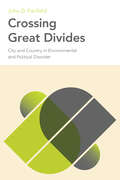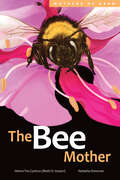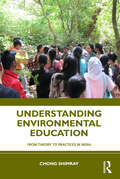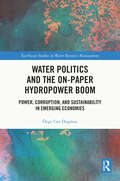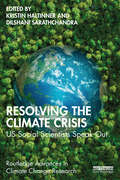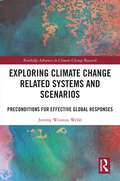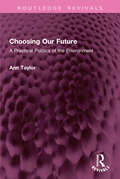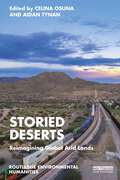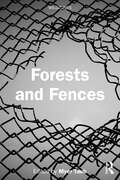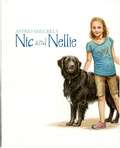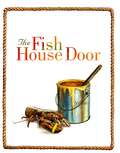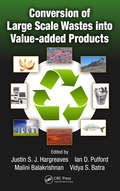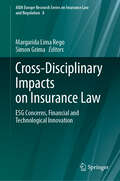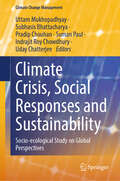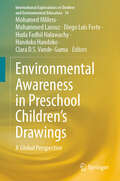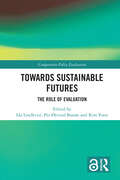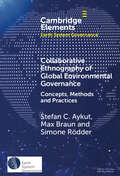- Table View
- List View
Crossing Great Divides: City and Country in Environmental and Political Disorder (Urban Life, Landscape and Policy)
by John D. FairfieldRanging across two centuries of American history, Crossing Great Divides argues that the habit of construing city and country as opposites is at the root of our current environmental and political disorder. This oversimplifying dualism has distorted how we planned cities, our patterns of production and consumption, how we deal with waste, and how urban and rural populations perceive each other. Conventional urban environmental reform has made modern city life possible, but it has done little to limit the despoliation of distant places. Nevertheless, the successes of urban environmental reform remind us of what is possible. John Fairfield concludes with a case study of Phoenix, Arizona to demonstrate this dysfunctional relationship between city and country while developing a sympathetic critique of the Green New Deal. He suggests how we might bridge the “great divide” as we face the daunting challenges the twenty-first century is pressing upon us.
The Bee Mother (Mothers of Xsan)
by Hetxw’ms Gyetxw HusonLearn about the life cycles of different kinds of bees in this enlightening picture book. As flowers and trees begin to bud and bloom, Nox Ap, the bee mother, emerges from her winter sleep. To the Gitxsan, she is nature&’s gardener. Without her hard work as a pollinator, we could not enjoy the fruits of strawberries and huckleberries. Follow her life from the first thaw of spring to the end of autumn. In the seventh book of Hetxw'ms Gyetxw (Brett D. Huson)&’s Mothers of Xsan series, readers will discover the important role of the bumblebee, the honeybee, and the yellow jacket wasp in the Xsan ecosystem.
Understanding Environmental Education: From Theory to Practices in India
by Chong ShimrayThe book establishes the importance of environmental education by tracing its history and the developments that have taken place subsequently to date. It provides basic understanding about environmental education as well as valuable suggestions for its effective incorporation in the school curriculum. The strength of the book lies in its content as all major areas of environmental education have been addressed such as school curriculum, professional development, and policies, especially in the context of India, thus making it a unique and go-to resource for all stakeholders working in the field of environmental education. The well-balanced content will help readers appreciate the nature of environmental education and its distinctiveness from other subject disciplines as well as environmental studies and environmental science substantiated with several examples and illustrations. What is striking about the book is its proposed road map which is critical for successful implementation of environmental education in India with the launch of the National Education Policy 2020 and the subsequent introduction of new curriculum frameworks. The book will be useful to students, preservice teachers, and teacher educators. It will also be of much value to in-service teachers, practitioners in different settings, teachers, policy makers, curriculum developers, and researchers in the field of environmental education.
Water Politics and the On-Paper Hydropower Boom: Power, Corruption, and Sustainability in Emerging Economies (Earthscan Studies in Water Resource Management)
by Özge Can DogmusThis book examines how the on-paper hydropower boom impacts the safe and fair access to water and energy in emerging economies.The global hydropower boom is largely made up of small hydropower plants located in emerging economies, but a lack of funding, over-ambitious planning, and corruption have halted the production of these projects. Describing this state as the ‘on-paper’ hydropower boom, this book shifts attention to the hydrosocial problems arising from hydropower projects that remain on paper. It examines how these proposed but unbuilt projects can lead to disruptions in the control and governance of water resources and increase the international dependence of emerging countries due to deep problems in their sustainable development planning and how all this can affect both ecosystems and the communities that depend on them. In doing so, it critically examines the dominant discourses on energy security and sustainable development, emphasises the extent to which the effects of global imperialism are at play, and examines the effects of international power relations in the hydrosocial context and their implications for perpetuating international relations of dependency. Further, this book provides a unique perspective on the global hydropower boom by highlighting that although the global hydropower boom largely remains on paper, it can still have a significant impact on human–water systems. Contributing to the debate on hydrosocial relationships, each chapter offers an insightful examination of the social, cultural, and political interactions that humans have with water and uses these insights to provide a nuanced understanding of the challenges and issues associated with on-paper plans.This book will be of great interest to students and scholars of water politics, water governance, political ecology, corruption and environmental economics, as well as sustainable development policymakers.
Resolving the Climate Crisis: US Social Scientists Speak Out (Routledge Advances in Climate Change Research)
by Kristin Haltinner Dilshani SarathchandraThis book brings together a team of renowned social scientists to ask not why climate change is happening, but how we might learn from its human dimensions to raise public and political will to fight against the climate crisis.Despite efforts for mitigation, global emission levels continue to increase annually and the world’s wealthiest nations, including all of the G20 countries, have failed to meet their Paris Climate Goals. In the absence of political will, many have called for individuals to act on climate change by mitigating their own carbon footprint through having fewer children, driving less, using LED lightbulbs, or by becoming vegetarians. While compelling, individual lifestyle changes on this scale are unlikely to prevent climate disaster. Resolving the Climate Crisis presents informed solutions for social change that center human behavior and emotions, political systems, and societal structures. Across a series of concise and accessible chapters, authors explore potential solutions to climate change, addressing topics including Indigenous ecologies, LGBTQ+ community engagement, renewable energy technologies, and climate justice. Their expert engagement with the social and behavioural sciences makes this book not only an essential handbook of climate change solutions but also an innovative model for public-facing social science scholarship.Resolving the Climate Crisis will be an essential resource for students and researchers of climate change, as well as policy makers working to develop meaningful strategies for combatting the climate crisis.
Exploring Climate Change Related Systems and Scenarios: Preconditions for Effective Global Responses (Routledge Advances in Climate Change Research)
by Jeremy Winston WebbJeremy Webb draws on multiple disciplines to piece together the climate change puzzle, identifying what it would take to limit climate change and its impacts.The book starts with a summary of the climate change problem and develops a Climate Change, National Interests, International Cooperation (CCNIIC) model of the climate response system. Webb reviews ‘reverse stress testing’, ‘backcasting’, and ‘theory of change’ methods, showing how they can be used to collect a large sample of possible futures. He also shows how we can explore the multiverse of futures using a new method called thematic chain analysis, finding relevant connections across scenarios. In the second half of the book, Webb explores 175 scenarios collected through 27 interviews with climate change experts. From these scenarios a signal response model is developed. Preconditions for effective social change and behaviour, political will and policy, as well as business and economic activity are synthesised. Lessons include preconditions for effective global responses to climate change, showing what it takes to limit climate change and related impacts. The book finishes with an epilogue, applying the signal response model and preconditions for effective global responses to COVID-19, demonstrating that models from this book can be applied to other global response problems – and used to quickly assess possible response strategies.This book will be of great interest to students and scholars of climate change, environmental policy and future studies.
Choosing Our Future: A Practical Politics of the Environment (Routledge Revivals)
by Ann TaylorFirst Published in 1992, Choosing Our Future presents a personal but highly rigorous account of the environmental problems facing us and of the ways in which they can be tackled. Ann Taylor's approach centres on the traditional values of democratic socialism, establishing their inherent compatibility with modern concerns of sustainable economic development and environmental protection. She argues that people and planet are interdependent and that ensuring a balance between the needs of both is the historic role of the Labour Party. Lucid and topical, this book will appeal to anyone who is interested in realistic, hard- headed solutions to environmental problems. It will be of interest to general readers and to members of the Labour movement, environmentalists and professionals in environmental management and regulation. It will also be useful to students of politics and development.
Storied Deserts: Reimagining Global Arid Lands (ISSN)
by Aidan Tynan Celina OsunaStoried Deserts makes a crucial and critical intervention in the field of environmental humanities by showcasing an emerging body of research on desert places from around the world.Deserts, despite dominant stereotypes of wasteland and barrenness, are culturally and ecologically abundant places. This edited volume sets out to reimagine the world’s desert places and the very concept of "the desert" itself, taking a boldly interdisciplinary and multicultural approach. Authors engage in literary ecocriticism and ecopoetics, film and visual studies, critical theory, personal and transdisciplinary reflection, creative practices, and historical scholarship. Through their diverse range of perspectives, contributors show how arid lands have been and can be understood as sites of narrative production, places where signs and imaginaries are born from the materialities of space and entanglement. In this way, this volume highlights how the storied matter of the Earth’s deserts informs lived realities, environmental histories, cinematic and literary imaginaries, political conflicts, and even intellectual categories such as "the human" and "the elemental".Ultimately, this book shows that reimagining desert places can help us to grapple with the epochal challenges of the Anthropocene. It is an important and engaging collection for scholars and students across disciplines that helps establish the value of desert humanities.
Forests and Fences (WildZones)
by Myer TaubThis book examines critical themes in environmental studies though theatre and performance studies. It experiments with forms along with the practice of praxis to provide radical frameworks for resilience in the contemporary age of crisis. Drawing on Ravi Sundaram’s concept of “Wild Zones”, it explores the kinetic overflows in informal sites, but also in the intimate spaces that have been realigned or shocked or fenced in, especially in the context of the COVID-19 pandemic.This volume will be of great interest to scholars and researchers of theatre and performance studies, environment and sustainability, and environmental humanities.
Nic and Nellie
by Astrid SheckelsEveryone gets homesick. And Nic is no different. She's so excited about spending the entire summer on a small New England island with her grandparents that she counts down the days through winter and spring. But when the grand adventure finally begins, she finds tears and loneliness instead of joy and freedom. Astrid Sheckels' picture book Nic and Nellie is a gorgeously illustrated, heartwarming story of a girl and her beloved dog, Nellie, who slowly learn that new places really aren't so scary, and that often friends can be found around every corner, even in old row boats, tidal ponds, and stinky mud flats.
The Fish House Door
by Robert BaldwinShawn comes from a long line of island lobstermen. His father, grandfather, and great-grandfather have all hauled traps, baited pockets, painted buoys, and cleaned their brushes on the door of the same fish house for decades. To Shawn, it's just a weathered old piece of wood with broken hinges. But when an art dealer comes to visit, he gives Shawn a new perspective on the fish house door, and a fresh look at the people and traditions that have shaped his past and will chart his future. The Fish House Door, illustrated by rising star Astrid Sheckels, won the 2010 Moonbeam Award (Gold Medal) for Best Picture Book in the All Ages category.
Conversion of Large Scale Wastes into Value-added Products
by Malini Balakrishnan Justin S. J. Hargreaves Vidya S. Batra Ian D. PulfordThis book describes how large-scale wastes can be used as a resource for making other materials. It covers metal processing wastes (slag, red mud), fly ash from coal combustion, electronic waste, and food waste. These wastes have potential to be used in bulk (e.g., for construction applications) as well as for niche applications (e.g., in the areas of catalysis). This book reviews literature from around the world on how large-scale wastes are in use by industry as well as research on the potential applications of wastes.
Cross-Disciplinary Impacts on Insurance Law: ESG Concerns, Financial and Technological Innovation (AIDA Europe Research Series on Insurance Law and Regulation #8)
by Simon Grima Margarida Lima RegoThis book explores the insurance sector’s potential role, influence, and impact on society in light of new environmental, social, and governance (ESG) concerns. Furthermore, it looks into how financial and technological innovations help reshape insurance regulation and business models. Unlike their predecessors, 21st century insurers have a growing impact on cross-sector service provision by making available to their clients a wealth of expert knowledge and experience in data analytics. The book delves into insurers’ transition from suppliers of products – consisting of risk coverage or investment opportunities – to providers of various services, and ultimately to solution providers by partnering with their clients so as to prevent failure, optimize their clients’ operations and help them excel in their economic sector. Insurance regulations and policies can be affected by various factors, such as changes in the economy, technological advances, and shifting consumer preferences, to name a few. Additionally, the insurance industry can have a significant bearing on the wider economy, making it important for the industry to operate within a framework of comprehensive regulations.This book includes a diverse set of theoretical, empirical, and policy-oriented chapters on particular aspects of new trends and wider analyses leading to a more systematic understanding of the industry’s socio-economic role. It offers a mixture of chapters from insurance academics and professionals from different countries, cultures, and scientific backgrounds. The methodologies used are diverse, including legal, sociological, historical, economic and financial as well as interdisciplinary analyses. The book has a global scope, including chapters of a more global nature and others addressing particular jurisdictions on different continents, including Europe, Asia and North America.
Climate Crisis, Social Responses and Sustainability: Socio-ecological Study on Global Perspectives (Climate Change Management)
by Suman Paul Uday Chatterjee Uttam Mukhopadhyay Subhasis Bhattacharya Pradip Chouhan Indrajit Roy ChowdhuryThis proposed book aims to present an analysis of several crisis issues induced by global climate changes and implications at the micro-level, particularly from the perspective of ground-based study. Climate crisis leads to several socio-ecological issues which need to discuss with some empirical case studies from the contextual global evidences. Climatic crisis generates several social responses which are associated with mitigating issues in addition to sustainable development goals. Under these circumstances, several loopholes interlinked with climatic crisis need to expose in the present-day context. This book argues that it is important to understand the issues from multiple dimensions. It identifies some important dimensions to discuss in the process. Themes we purpose to cover are: several field-based studies are included for which micro-level field-based data would incorporate to understand current crisis induced by climate change, thus exposing the vulnerabilities of the communities which would be incorporated in different chapters with adequate representation of qualitative methods, modelling-based geospatial approach. Therefore, some secondary data-based studies have also been included to provide a broader picture. Additionally, this book aims to provide an interdisciplinary understanding of the issues mainly from the lenses of Geography, Economics, and Sociology as well as Environmental Studies too. Given the focus of this study, it is believed that an approach that harmonizes the cognitive domain from different discipline is appropriated. A combination of chapters using qualitative as well as quantitative methods also made this book exclusive from others. We believe that this edited book surely contributes the knowledge domain with some relevant chapters’ discussion in the contemporary time and leads to reduce the gap of knowledge.
Environmental Awareness in Preschool Children’s Drawings: A Global Perspective (International Explorations in Outdoor and Environmental Education #14)
by Mohamed Mliless Mohammed Larouz Diego Luis Forte Huda Fadhil Halawachy Handoko Handoko Clara D. S. Vande-GumaThis edited volume investigates multiple perspectives of environmental meaning-making among children by evaluating preschool children’s drawings on the environment. It critically traces the formation of early attitudes towards the environment before children’s exposure to formal environmental education. Similarities and differences are explored among preschool children's drawings across diverse cultural and geographic backgrounds. Over five sections covering Morocco, Indonesia, Nigeria, Iraq, and Argentina, each one examines the factors affecting children's environmental drawings, such as age, gender, and geography. Using different theoretical frameworks, the chapters are written by researchers of environmental discourse and ecolinguistics with a background knowledge in environmental studies from a social science perspective. This book is of interest to researchers interested in ecolinguistics and socio-semiotics fields of study. This seminal book also paves the way for further research on preschool environmental education.
Towards Sustainable Futures: The Role of Evaluation (Comparative Policy Evaluation)
by Kim Forss Ida Lindkvist Per Øyvind BastøeTowards Sustainable Futures serves as a guide to better understand what roles evaluation can play in sustainability. Rather than proposing a single definition of sustainability or methodological approach, this book gives us the tools to improve the quality and relevance of evaluation of sustainability. Divided into two parts, the first part introduces the reader to key debates and challenges related to evaluation of sustainability. Part Two provides examples of methods and applications. By combining a stellar line up of specialists, theorists, and practitioners in the field of development evaluation with expert, accessible and engaged analysis of key issues, Towards Sustainable Futures is a must-read source for re-tooling and re-focussing evaluation towards the green transition imperative. It should be essential reading for scholars and practitioners of evaluation.Chapters 1, 4, 6 and 15 of this book are freely available as a downloadable Open Access PDF at http://www.taylorfrancis.com under a Creative Commons [Attribution-Non Commercial-No Derivatives (CC-BY-NC-ND)] 4.0 license.
Collaborative Ethnography of Global Environmental Governance: Concepts, Methods and Practices (Elements in Earth System Governance)
by null Stefan C. Aykut null Simone Rödder null Max BraunEnvironmental mega conferences have become the format of choice in environmental governance. Conferences of the Parties (COPs) under the climate change and biodiversity conventions in particular attract global media attention and an ever-growing number of increasingly diverse actors, including scholars of global environmental politics. They are arenas for interstate negotiation, but also temporary interfaces that constitute and represent world society, and they focalise global struggles over just and sustainable futures. Collaborative event ethnography (CEE) as a research methodology emerged as a response to these developments. This volume retraces its genealogy, explains its conceptual and methodological foundations and presents insights into its practice. It is meant as an introduction for students, an overview for curious newcomers to the field, and an invitation for experienced researchers wishing to experiment with a new method. This title is also available as Open Access on Cambridge Core.
